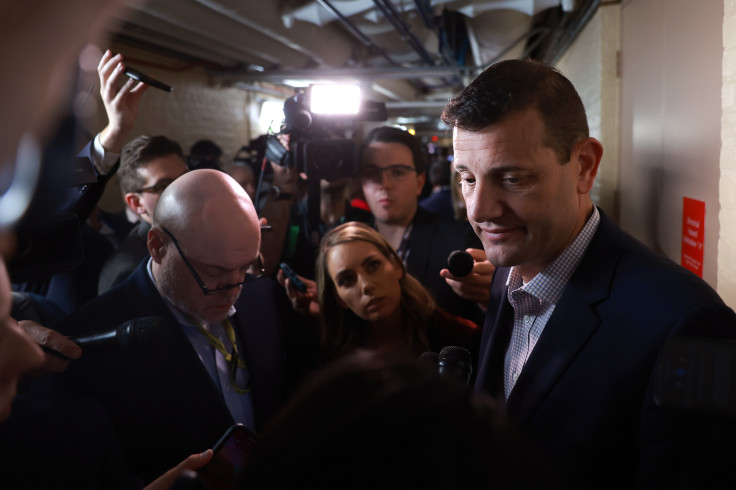
Congress is expected to vote on whether to slash Medicaid as the Trump administration seeks to cut down government spending. But in the fight for the long-contested insurance program, some Republican lawmakers have potentially much more to lose than others.
The GOP-controlled Congress is currently eyeing enacting sweeping changes for the Medicaid program, which is most financed by federal taxpayers, who pick up as much as 80% of the tab in some states. Among the considered changes are work requirements and paying a shrunken, fixed rate to states.
Other cuts on the table include a proposal to change the federal government's reimbursement to a per-person limit. That would shift the costs to states, which might be forced to make tough choices about who or what they cover, according to Joan Alker, executive director of the Georgetown Center for Children and Families.
That could result in GOP lawmakers taking away billions of dollars from the nearly-free health coverage offered to the poorest Americans over the next decade, according to The Associated Press.
"It's common sense," House Speaker Mike Johnson (R-LA) said about the possible changes. "Little things like that make a big difference not only in the budgeting process but in the morale of the people. You know, work is good for you. You find dignity in work."
GOP lawmakers are expected to vote on the matter soon. However, they can afford to just lose one vote in the House, given the 218-215 House split, the tightest in modern history. But that may be difficult, as some Republicans currently hold seats representing districts where many constituents rely on Medicaid benefits.
A review of enrollment in Medicaid by congressional districts from Politico found that 11 Republicans in competitive seats represent larger-than-average Medicaid populations— collectively nearly 2.7 million recipients. A vote to cut the program from these lawmakers would disproportionately affects their constituents, and it could come back to haunt them in the 2026 elections.
Among the most vulnerable lawmakers is Gabe Evans, from Colorado's 8th Congressional District. He was elected by less than 1 percentage point in November, unseating incumbent Democrat Yadira Caraveo. His constituents are mostly white but the newly-drawn district comprises the highest number of Hispanic residents of any congressional district in Colorado.
More than a quarter of Evans' constituents are on Medicaid, and he has largely avoided sharing his opinion on the proposed cuts, saying he would support "commonsense spending reductions."
David Valadao, from California's 22nd Congressional District is also on potential thin ice. Although he won his sixth non-consecutive term in November by 7 percentage points, he represents the higher portion of Medicaid enrollees of all House lawmakers.
In a recent letter to House GOP leaders, Valadao and other Hispanic lawmakers argued that Medicaid cuts "would have serious consequences, particularly in rural and predominantly Hispanic communities where hospitals and nursing homes are already struggling to keep their doors open."
Another long-time Republican lawmaker, Ken Calvert (CA-41) is in a difficult position. Calvert is the longest-serving Republican in the California congressional delegation and has been in office since 1993. About 27 percent of his constituents are enrolled in Medicaid. He recently told Politico that the GOP must use the budget reconciliation process to extend tax cuts but "will not touch Social Security and Medicare benefits.
"We are not interested in cutting the social and health care safety net for children, disabled and low-income Americans," he said. "We are focused on eliminating waste, fraud, and abuse, as well as strengthening work requirements for able-bodied working age adults with no children."
Other vulnerable Representatives include: Robert Bresnahan (PA-8), Nick Begich (AK), Juan Ciscomani (AZ-6), Jeff Hurd (CO-3), Dan Newhouse (WA-4), John James (MI-10), Mike Lawler (NY-17) and Eli Crane (AZ-2).
Experts predict these measures will not pass, given that Republicans need to achieve near unanimity in the issue. Nevertheless, Democrats are campaigning on the plan in efforts to unseat these vulnerable lawmakers. The Democratic-aligned group Protect Our Care is targeting several Republicans in the most competitive districts with ads urging them to stop the cuts, including Valadao, Calvert, Lawler, Brenahan and Newhouse.
"The bulk of these cuts would have to be in Medicaid, and that's why they're not going to get the requisite votes they need to get it passed with the margins that they have right now," said Bill Hoagland, senior vice president at the Bipartisan Policy Center and a former GOP Senate Budget Committee staffer. "Leaders are going to have a lot of difficulty getting the votes to pass this resolution."
© 2025 Latin Times. All rights reserved. Do not reproduce without permission.




